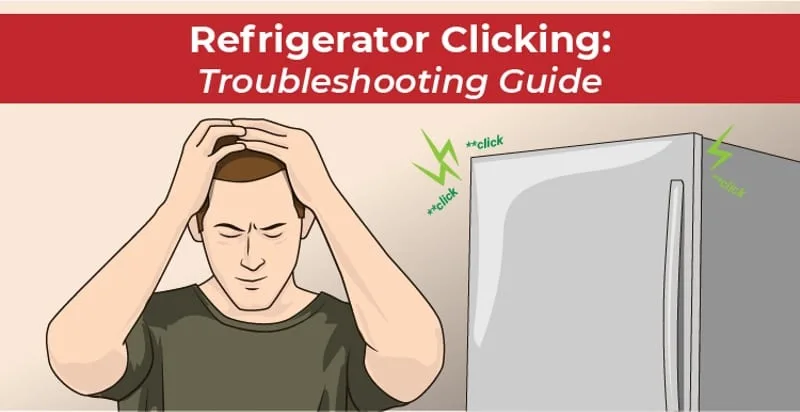If you hear your refrigerator clicking, you might worry the unit is going out and will need to be replaced.
But there are some simple fixes to try before calling a local appliance repair pro.
4 Common Causes for a Refrigerator Clicking
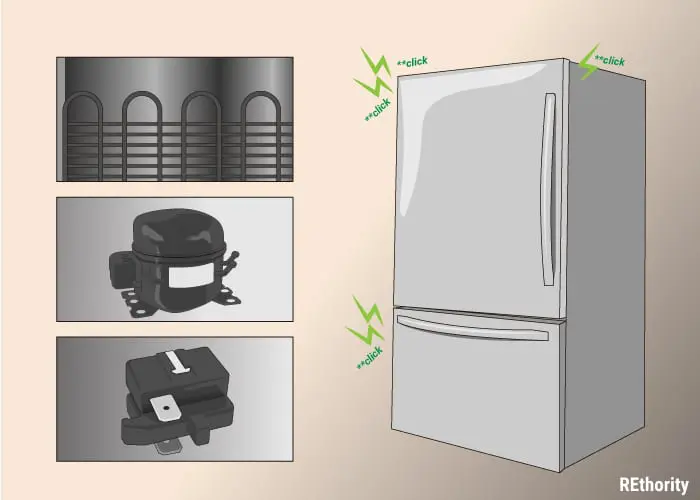
Refrigerator clicking is caused by one of a few reasons. The clicking sound may come from your fridge’s condenser coils, the compressor, start relay, or the condenser fan.
One of the first troubleshooting methods you should use is determining whether or not the refrigerator is cooling properly. If the clicking sound is accompanied by normal cooling, skip down to the Condenser Fan section.
If the clicking sound is accompanied by a loss of cooling (and a puddle of water or spoiled food), keep reading to determine what the issue stems from. Here’s how to spot which problem is happening to your refrigerator and how to fix it.
1. Dirty Condenser Coils
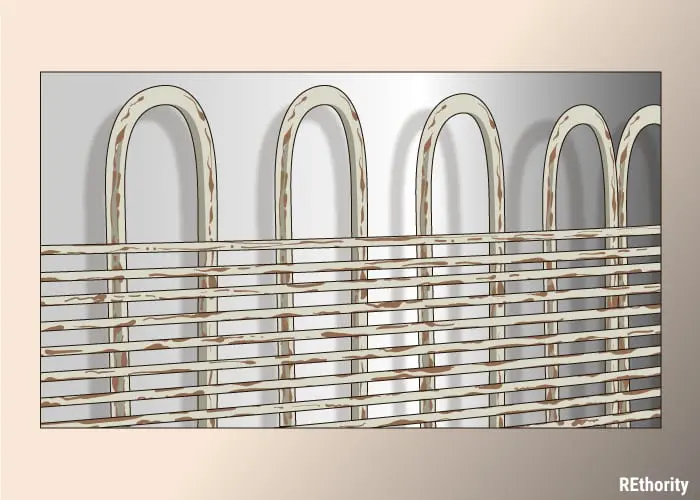
Your refrigerator’s compressor has a simple job: Compress the gas that cools your refrigerator. After it is compressed, the coolant gas moves through condenser coils to help the heat dissipate from the gas so it can be compressed again.
This process works very well, but dirty condenser coils can throw it off and reduce the cooling capacity. When the condenser coils are coated in dirt, kitchen grease, dust, or pet hair, they don’t work efficiently.
They can’t give off or dissipate the heat as well as they can when they are clean. The dirt and grime essentially create a physical barrier that stops the coils from getting rid of the excess heat from the compressed gas.
How does this relate to refrigerator clicking? When the refrigerator is unable to cool efficiently, it runs its parts more often to reach the right temperature.
If dirty condenser coils are the culprit, the clicking sound you hear is actually the sound of the refrigerator’s compressor turning on over and over.
Under normal circumstances, the compressor wouldn’t have to run as often because it efficiently cools the fridge.
Dirty Condenser Coils: The Fix
If your condenser coil is dirty, the quick fix is cleaning it off. You may want to stop by a store that sells plumbing items and pick up a special condenser brush designed to effectively clean condenser coils.
Otherwise, you can use a vacuum and a dry, clean cloth.
- Before you attempt to clean the condenser coil, unplug the refrigerator to avoid any electrical shocks.
- Then, pull your refrigerator out to gain easier access to the condenser coil. Depending on the refrigerator model, you might find the coils behind the refrigerator or on the bottom.
- You can now use the condenser brush to get in between the bends of the coil and thoroughly clean it off. If you’re using a vacuum and dry cloth instead, use a hose attachment to suck as much dust and debris off the coil as you can. Then, follow behind with a dry, clean cloth to remove any remaining dirt.
- Plug the refrigerator back in and listen to see if you hear more refrigerator clicking.
If not, that’s great news – you fixed it with a simple cleaning of the condenser coil! If you still hear clicking, keep reading to find out what the problem may be and if you need to call a professional.
2. Failed Compressor
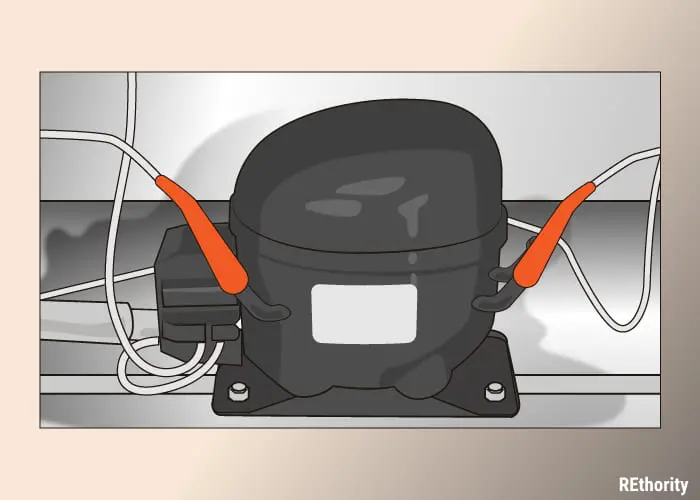
As we mentioned, the refrigerator’s compressor compresses the coolant gas that keeps your refrigerator cold. If there is a problem with your compressor, it may make clicking sounds often and need to be replaced entirely.
A bad compressor may be accompanied with little to no cooling taking place in your refrigerator. So you might smell spoiled food or notice condensation on items inside.
The compressor normally runs about 50% of the time in older refrigerators and up to 90% of the time in newer, energy-efficient models.
Most of the energy is used when the compressor actually turns on and off, so models that run the compressor more often save on energy usage and costs. If your compressor is turning on and off constantly, you’ll hear a click each time.
It could be due to an overload of power, overheating, or something as trivial as a refrigerator light that isn’t turning off or blocked air vents.
Faulty Compressor: The Fix
The inner workings of compressors can be a challenge to navigate, so if your compressor appears to be the problem, it’s best to call a professional.
They can diagnose exactly what is going wrong with your compressor and determine whether it needs to be replaced or if there’s an inexpensive, easy fix.
3. Faulty Start Relay
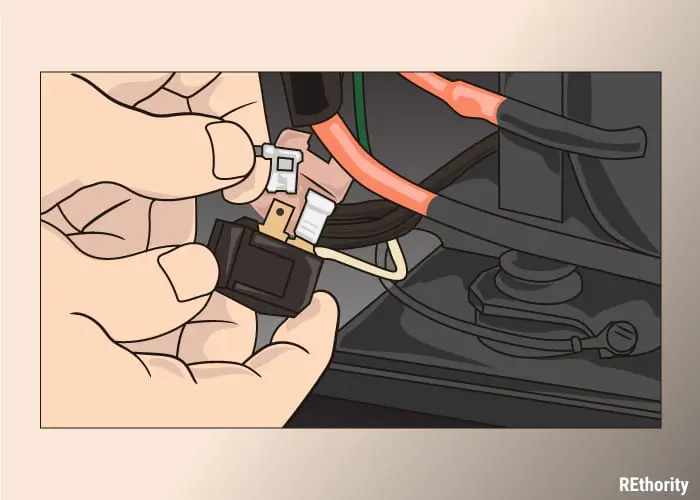
One issue the refrigerator’s compressor may be having is a bad start relay. If the start relay isn’t working properly or at all, you will hear soft clicks every few minutes.
This is due to the compressor attempting to turn on, failing, and trying again in a set interval. The start relay kicks the compressor on using a mechanically set schedule, or when the temperature rises above a certain range.
The start relay is a small box that is attached to the compressor on the side. It starts the cooling process by making the compressor begin to compress the refrigerant gas.
If you think the start relay may be the source of refrigerator clicking, it’s easy to see for yourself without calling a professional just yet.
Bad Start Relay: The Fix
- Unplug the refrigerator. Locate the compressor and attached start relay (a small box attached to the compressor). You may need to remove the back panel to access it.
- Unplug the start relay from the compressor. Shake it gently and listen for a rattling sound. If you do hear rattling, it indicates that the start relay needs to be replaced.
- Visit a hardware store with your old start relay in hand. They will be able to give you the correct replacement part.
- Attach the start relay to the compressor at the same point, replace the back panel, and plug the refrigerator back in. This should stop the refrigerator clicking sound.
If it does not stop the clicking sound, there’s one more thing you can check: The condenser fan.
4. Broken Condenser Fan
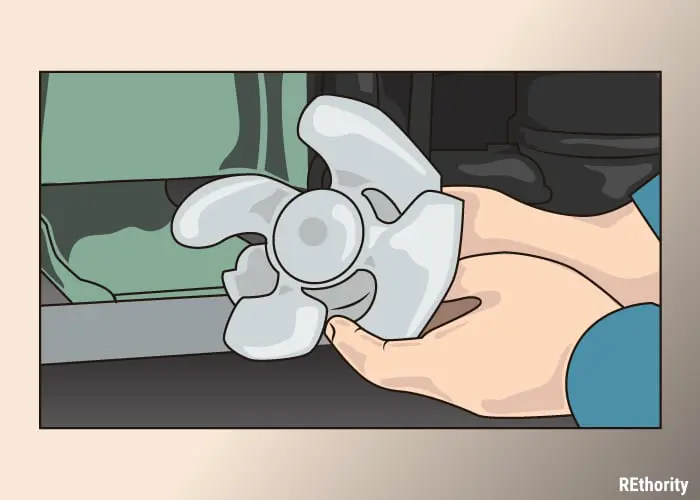
If your refrigerator is still cooling efficiently but you hear a clicking sound (it may also be a scraping, clanking, or no sound at all), check the condenser fan.
It is responsible for blowing air over the condenser coil to carry and spread the cold air from the refrigerant gas inside. Condenser fans can have a few issues.
They may become jammed, the blades might be bent and scraping or clicking against another part in the refrigerator, or they may stop working.
Faulty Condenser Fan: The Fix
- Unplug your refrigerator and move it away from the wall. Remove the lower back panel and look inside for a small fan near the compressor.
- Try to turn the condenser fan by hand. Does it spin freely or recreate the clicking sound you’ve been hearing?
- If the same sound you’ve heard, and you can see the blades are bent out of shape, you can carefully bend them back to see if that will fix the problem. Replace the lower back panel and plug the refrigerator in again to see if it worked.
If the condenser fan isn’t turning, the clicking sound is likely due to the compressor overheating. In this case, you will need a new condenser fan.
You can call a professional to ensure you get the correct part properly installed or order the part yourself and install it in place of the old fan.
Maintaining Your Refrigerator

If you were able to stop the refrigerator clicking sound by cleaning the condenser coils, replacing the start relay, or reshaping the condenser fan, keep the solution that worked in mind.
If you ever hear your refrigerator begin making a clicking sound, you’ll know what to check first. As always, with large kitchen appliances, keeping a regular maintenance schedule helps avoid more expensive problems in the future.
Try to keep the condenser coils clean. Ensure the air vents are not blocked, and keep the door closed as often as possible. Finally, avoid placing too much or too little food into the fridge.
If you take good care of your refrigerator, you’ll keep it in better working condition, avoid unnecessary repair service calls, and increase its overall lifespan.
When to Call a Professional About Refrigerator Clicking
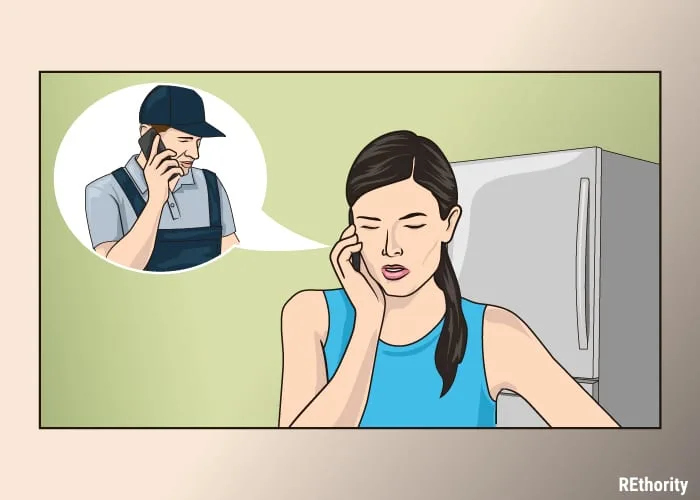
It’s a good idea to run through these simple troubleshooting methods to see if you can quickly and fix the problem when your refrigerator is making a clicking sound.
However, if none of the above solutions seem to stop the problem, don’t keep tinkering with it. You should call a professional appliance repair technician.
With so many different models and types of refrigerators and no shortage of information available online, you may end up spending lots of money on unneeded parts, damage essential parts of your refrigerator, and waste time troubleshooting.
We partnered with Networx to help you find local appliance repair techs. Click to below to get a FREE quote.
How Do You Stop Refrigerator Clicking?
To get your refrigerator back in working order quickly, and avoid spending money on unnecessary parts, call a local appliance repair technician to fix the problem.
They will be able to diagnose and repair any issue happening to your refrigerator. If you tried any of these troubleshooting tips and discovered that the problem persists, make sure to pass that information along to your repair tech.
This will save them time and help them find the real culprit for the refrigerator clicking faster. After all, they charge by the hour, and the more they know, the quicker they can find the problem.
Resources:

